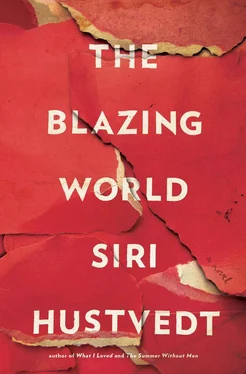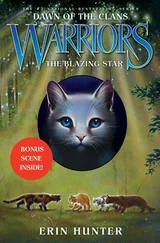Harry didn’t believe the piece was finished. It’s wrong, she said, too comic. She added letters and numbers in many colors. She added more figures. It wouldn’t matter, she said, whether anyone saw them or not. She needed to make them, and she did, small, perfectly formed wax persons. She sewed clothes for some and left others naked. She could work on them almost anywhere, and more than once I sat down on a hard little body on the sofa, smothering some man or woman or child under my colossal ass. After these accidents, Harry would take the poor rumpled critter from me, rearrange its hair or limbs, and generally fuss over it. Why, it’s you, Cornelius, she would say, or: Keisha, I wondered what had happened to you. In Harrydom, nobody went nameless.
She wrote and read as well. She punched her punching bag (good exercise and cathartic release of perpetual anger) and visited her shrink cum usual. Maisie’s film Body Weather about our own household lunatic came out in September. Harry was red-faced with pride at the opening in New York at the Quad Cinema on Thirteenth Street. Maisie has a gift for making insanity look, if not normal, at least comprehensible. Halfway through the film, the Barometer’s father, Rufus Dudek, a tired man with bloodshot eyes, who still lives in the godforsaken Nebraska town where he raised his sons, holds up the prodigious drawings his youngest boy, Alan (later the Barometer), made when he was seven years old, and proceeds to tell the off-camera Maisie about the tornado that killed his wife. A wall of the family’s trailer caved in and crushed her while he and his boys were out “visiting.” Alan Dudek’s mother died of weather. Alan made his way to New York and the Studio School, but while he was in a life-drawing class he cracked up and was hauled off to the first of many psychiatric wards. He was twenty-two when he became the Barometer, a man who quiets the winds and stirs them up, a man who feels the motion of the spheres via his high-tech, super-duper, but ever-so-fragile nervous system.
After Body Weather , Maisie launched her film on Harry. She trailed after her mother in the studio, set up shots by the water, and held the camera tightly on Harry as she told the story of her life or expounded on ideas, in which the words preconceptual and embodied came up frequently. I credit Maisie with propping up Harry’s sacked dignity. I underscore this: I don’t know what we would have done without Maisie. The hours of footage mounted. The daughter was going to tell the mother’s story, come hell or high water or hurricane or typhoon, and this made Harry happy, at least intermittently.
I wrapped up my own autobiography-hyphen-memoir, had it typed up on a computer by a woman named Edith Klinkhammer (no fooling), mailed it out to agents, and, after several rejections, found myself a willing representative and then, hail holy light, a New York publisher, after which Harry could gloat at me with her own “I told you so.” Those are rosy days now when I look back on them — that stretch of freedom we had together after we found each other again. The artists in residence had left us, all except the Barometer, whose existence had become more orderly because he had a doctor and a little lithium and a new diagnosis — schizoaffective. All in all, I have to call those days rosy, just plain old rosy, cozy days of coffee and bagels and goodbye-I’m-off-to-work-now-my-love kisses in the morning and a whole lot of chitchat after work about not all that much as we chopped vegetables for or cleaned up after dinner. We yelled at the evil president in unison and had a few royal fights about men and women and what’s innate in one sex or the other and what’s not. Yes, to be honest: We fought. We fought, but we also rolled in the hay, and, to be honest again, there were plenty of nights we were too tired to do any rolling because we weren’t young anymore, and we talked instead, long sessions of thinking aloud about art and poems and our youngest ones, Aven and Bran, the children who would brave a future we would never see.
When Rune died in his own contraption, he made the cover of the New York Post and the Daily News , and page 9 of The New York Times . Innumerable other “outlets” opined on his tragic exit from the planet as well. Tributes to Rune spewed from the media maw, accompanied by photos of still-youthful brooding artist decoratively slouched beside his works, including Beneath , no, especially Beneath . Art magazines devoted issues to his legacy, speculating on what might have been, had the remarkable bad boy only lived. He suffered from depression, it seemed. He had, in fact, a whole drugstore of pharmaceuticals in his bathroom to treat the condition. Sympathy for the down-in-the-dumps artist oozed from journalistic pores. Depression is a chemical imbalance, they wrote. The poor guy was a victim of his own cracked brain chemistry.
Not a word about Harry. Her obliteration was total. The Open Eye and the Eldridge letter were meant to cast a spotlight on Harry, but somebody forgot to hit the switch. One night over a nice piece of hake and broccoli, Harry declared in that creepy cold voice I had heard on the day she saw Rune that she had wanted to hurt him, but now that he was dead, she felt nothing. He was dead, but she was dead to him, too, dead to the story, dead to the pseudonyms. Her shining vehicle had crashed before it reached its destination, just as his had. Harry did not believe he had wanted to kill himself. There was nothing to be done. She had been more right than she had even known. The powers-that-be would never accept her art, because it was hers. Harriet Burden was nobody, a big, fat, unrecognized nobody.
I had prayed for Harry to end her obsession, but the stiff, bitter, defeated woman on the other side of the table unnerved me. I longed for some old vigor and bite. I longed for the dragon lady to return, if only for an hour or so. In this spirit, I asked the lady pugilist if the two hard punches that bastard had taken from her hadn’t felt pretty good. But Harry just stared at me, frost in her eyes. The punches, she said, had meant nothing. They had meant nothing because they had not had the desired effect. She had wanted to humiliate and shame him, to make him grovel before her — or something to that effect. It hadn’t worked. I wondered about Harry then. I wondered about who she was and if I really understood her at all. She could be so hard.
When she said the story was dead, she must have believed what she was saying, but later I discovered that she hadn’t let go of it completely. One afternoon, I interrupted her in the studio to tell her about a starred review I had received in Publishers Weekly , which included the words uproarious and tender . I had let myself in to surprise her with it. I tiptoed in the door with review in hand and saw that she was sitting at her long wooden desk with a pair of scissors in her hands, hunched over a large book with a concentrated look on her face. When I approached her, I looked down to see what she was doing.
The book she had in front of her was called The Book of Runes . It turned out that Harry had read and clipped every article that had been written about Beneath and the now-deceased traitor to her cause and had pasted them carefully into a fat, old-fashioned scrapbook, as if she were a 1950s housewife saving recipes. She did not need to explain. They were documents of the struggle — texts Harry called “proliferations.”
After that day, we had a little less than a year left, but seven months of it passed before Harry’s diagnosis. Every once in a while she complained of bloating and constipation, but show me someone over sixty who doesn’t complain of bloating and constipation. She grew a little thinner because she often felt full and couldn’t eat more, but her weight loss wasn’t extreme. She didn’t feel “quite right,” just “a little off,” that’s all. She would check it out with her doctor.
Читать дальше












